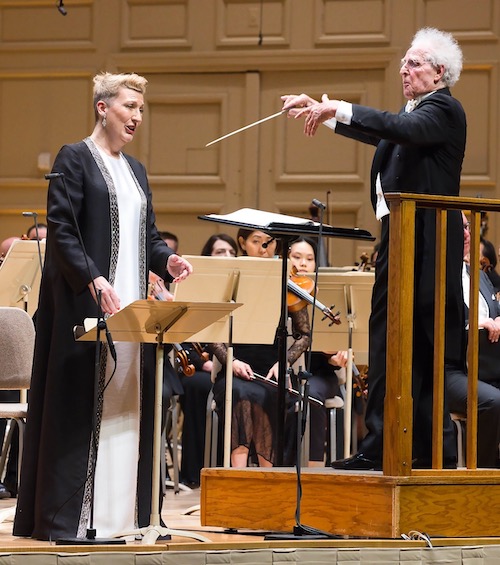Boston Philharmonic, superb soloists wrap season with a serenely eloquent “Das Lied”

Benjamin Zander conducted the Boston Philharmonic in Mahler’s Das Lied von der Erde with soloists Sarah Connolly and Stefan Vinke Friday night at Symphony Hall. Photo: Hilary Scott
Since returning from its pandemic hiatus two years ago, the Boston Philharmonic Orchestra has been revisiting the pillars of the standard canon with something of a vengeance. But the ensemble and its and music director, Benjamin Zander, have hardly been making things easy on themselves. Rather, they’ve been setting a higher bar, consistently seeking out–and illuminating–new insights obscured within familiar repertoire.
That was true again in the orchestra’s season finale Friday night. The program at Symphony Hall (also livestreamed, which was how I caught the event) paired Franz Schubert’s “Unfinished” Symphony with Gustav Mahler’s “unnumbered” symphony—the orchestral song cycle, Das Lied von der Erde.
Given the frequency with which the latter’s music is performed, Das Lied remains something of an outlier, at least locally: the Boston Symphony, hasn’t presented the hour-long score in nearly a decade. Written from 1908-09, it sets six of Hans Bethge’s free German-language translations of classical Chinese poems; the ones Mahler used offer meditations on the transient joys and sorrows of life.
His depictions of these eternal matters in the score present a bevy of challenges, technical and expressive. The orchestral writing features Mahler at his most colorful and inventive, yet the often spare textures are breathtakingly lucid and exposed. At the same time, his flexible approach to form resulted in music of uncommon structural variety and contrast.
Above all, Das Lied’s vocal demands are Herculean, both in terms of range and stamina. In tenor Stefan Vinke and mezzo-soprano Dame Sarah Connolly, though, Friday’s performance boasted a pair of soloists for whom those challenges held few terrors.
Singing with warmly rounded, slightly muscular tone, Vinke had no trouble projecting over the ensemble or, more impressively, cleanly enunciating his texts. He brought winsome colors to his part’s melancholy turns along with firm contrasts of character.
“Das Trinklied vom Jammer der Erde’s” bittersweet refrains rang with sad nobility while, in “Der Trunkene im Frühling,” Vinke touchingly limned that movement’s reflective moments. Though the opening of “Von der Jugend” took a moment to settle, the singer navigated its chromatic and melismatic twists with assurance and style.
Connolly accomplished much the same in “Von der Schönheit,” with a notably spirited central episode. She also opened up worlds of vulnerability in both “Die Einsame im Herbst” and“Der Abschied.”
The former’s rumination on the passing of seasons and longing for rest came across with poignant warmth. So did the finale, whose expansive size, on this evening, was partly made manageable by the singer’s ability to keep the music’s sense of wonder and beauty front-and-center.
In this she was ably matched by the BPO and Zander. Though the movement’s text focuses on the finiteness of human life, Friday’s performance sounded anything but grim. Quite the opposite: at its core was an otherworldly sense of joy, potential, and beauty.
This wasn’t because the interpretation eschewed the music’s tragic aura (though Zander did draw out some strangely dancey energy in the last orchestral phrase just before the voice enters). Rather, it accepted the inevitability of all things passing away: the mid-movement funeral march trudged appropriately.
But within that context, Zander and friends recognized that there is still much to stand in awe of, celebrate, and admire. Taken together, this can lead to a state (or at least moments) of transcendence. Friday’s reading ultimately achieved as much, the pellucid arpeggios framing the text’s closing repetitions of the word “ewig” (“forever”) resonating like a shimmering halo.
The orchestral contributions in the previous movements were similarly inviting, especially in “Das Trinklied,” “Die Einsame,” and “Von der Schönheit.” In each, the BPO delivered playing of rhythmic security and color.
Friday’s rendition of Schubert’s B-minor Symphony was likewise boldly projected. As with Beethoven, Zander apparently likes his Schubert fleet and lean. This 1822 score (called “Unfinished” because it only has two movements instead of the usual four) benefits from such an approach.
Last night, the piece sang, danced, and occasionally portended something menacing, though, as in the Mahler, serene resolution ultimately won out. Most impressive were the Andante’s minor-key outbursts, which packed thunder and impellent rhythmic fury–both turned on and off with the equivalent of the flip of a switch–in equal measure.
The Boston Philharmonic Youth Orchestra plays Mahler’s Resurrection Symphony, 8 p.m. May 3 at Symphony Hall. bostonphil.org
Posted in Performances